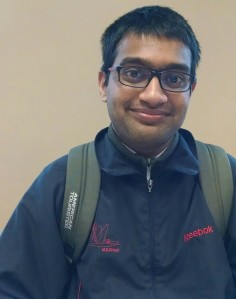Photos by Annmarie Welser
Story by Sierra Morris
As people flowed in and out of room 204, the smell of fresh dumplings poured into the halls of Memorial Union South. The room was teeming with more than 50 students and professors, all gathered for the April 7 Multicultural Hour: Chinese Dumpling Extravaganza. The annual Chinese Qingming festival, celebrated in April, was the inspiration.
The Asian Affairs Center hosts Multicultural Hour events every Thursday at 4 p.m. The events are free to the public, and the mission is “to improve understanding and promote better relationships among different cultures.”
MU international student Wenbin Guo is from China and is studying industrial engineering. Guo says he came to the event to meet new friends and to create a family away from home.
Tzuyang Chao, director of the MU Multicultural Hour events, says the Qingming festival is all about bringing people together.
“This festival is for family,” Chao says. “ In China’s culture, we focus more on family than in American culture. In China, we grow up with our parents. Here in America, you must become independent.”
Each dumpling was like no other, and molding the dough is an art form by itself. Traditionally, each shape is individually designed with a purpose: to feed the family and to connect at the dinner table.
“No matter what festival is going down, we always eat a dumpling together,” Chao says. “The dumpling is easy. It’s easy to cook, it’s easy to make, so that’s why we always make the dumpling.”
Although the festival focuses on families in a traditional sense, family can come in many different forms. Here at MU, friends gathered with helping hands and stories from memories of celebrating the festival at home.
Up next for the Multicultural Hour: bubble tea. Chao anticipates there will be more than 100 bubble teas prepared.

